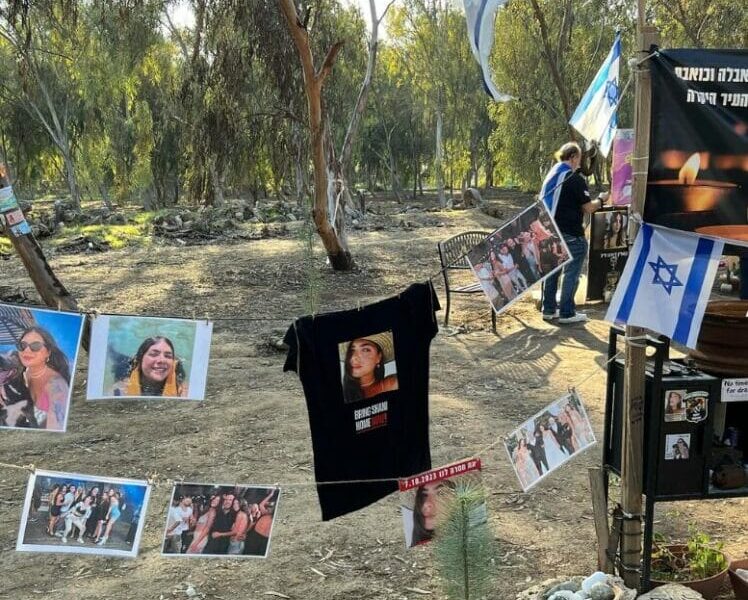The week before Rosh Hashanah, a sandstorm originating in the Syrian desert covered Israel in a thick layer of dust and sand. From Metulla to the Negev, the skies were yellow-brown, the sun could not be seen, the heat was unbearable and breathing was difficult. Generally these storms last no more than a day, and then the wind or rain wash them away. This storm was the worst in 75 years. Such a storm had never occurred at this time of year. It lasted for four miserable days. Airports were closed intermittently and organized outside activity was canceled.
During this “brown-out,” weather reports preempted the main news stories, including the issue of global warming, the effects of which seem to be involved here. But the skies cleared in time for Rosh Hashanah, the sun is again visible and it is possible to breathe.
The daily issues that will determine how we live and continue to survive are back to their place of prominence in the news. Rarely has our reality been at a more pivotal stage.
As I write this article, historic and far-reaching matters are being decided. The Iranian nuclear deal, the rift in U.S.-Israel relations and growing Arab provocations in Jerusalem will determine the level of physical security we will have to survive in what is undoubtedly the most dangerous and lethal region in the world.
The recent and controversial decision of the government to approve the exploitation of Israel’s vast natural gas reserves under the Mediterranean by a consortium of the Israeli “Delek” Energy group and Texas-based Noble Energy will determine what kind of society Israel will become. Will the revenue be used to create a more equal and affluent society, or will the growing gap between rich and poor continue to widen? The Knesset still needs to approve the deal. Meanwhile, Egypt, the client that is supposed to purchase much of the gas, has discovered even larger reserves in its territorial waters.
In addition to the security and economic/social questions raised by the Iran, Jerusalem and natural gas issues, another immediate problem has become part of the ongoing struggle. The struggle to determine the role of Judaism in our daily life came out of nowhere to assume a prominent place alongside the life and death issues mentioned above. All these issues relate to who we are and where we are headed.
This sandstorm of a different kind arose in a fairly innocuous and innocent way. Recently, the Israeli cable sports channel asked the Israeli Professional Football League, which manages the top two professional soccer leagues (for which I consult), to move one weekly game of the second-tier league from the regular Friday and Monday slots to Saturday afternoon. The channel wants to televise it live before the first-tier Premier League matches on late Saturday. Unlike other countries where both Saturday and Sunday are days off, in Israel only Shabbat, which begins at sundown on Friday and ends Saturday night, is a full-fledged day of rest. Saturday has always been the traditional day that soccer is played, from children to the top-flight Premier League. In recent years, the second-tier league moved to Friday and Monday for reasons of television programming.
The IPFL approved the Sport Channel’s Shabbat request to increase exposure, which can be leveraged into needed revenue to improve the financial situation of the teams and the sport. The moment the decision was publicized, all hell broke loose. A group of second-league players who observe Shabbat (many had previously played for years on Shabbat) contacted the players union to protest playing on Shabbat. The head of the players union recognized the opportunity for publicity and headlines, while completely ignoring the potentially fatal implications for the future of Israeli football (professional and amateur), and took the matter to court.
The judge upheld a law that had never been enforced. Shortly after the establishment of the state (1951), the Hours of Work and Rest Law was enacted to ensure no Jew could be forced to work on Shabbat, and an employer who wished to remain open on Shabbat had to receive permission from the state. In her decision, she said “the holding of soccer matches on Shabbat without approval from the economy minister is a criminal offense.” Wow! In other words, for more than 60 years, anyone who participated in any soccer-related activity has participated in a criminal offense.
Scores of Israeli businesses are open on Shabbat, including restaurants, museums, movie theaters, concert halls, beaches, pools, some public transport, mini-markets and some retail stores. Most, but not all, have obtained licenses to operate from the Minister of the Economy. Until the late ’70s and early ’80s, Israeli football was largely semi-pro or amateur, so it apparently never occurred to those who managed Israeli football that there was a need to receive a license to operate.
Therefore, the decision by the players union to petition the labor court opened Pandora’s box. To legally play on Saturday, a license had to be granted by the Minister of the Economy, a post currently held by the leader of the Orthodox Shas party, Arieh De’eri. If he granted this license, it would probably his last act as the head of his party. The IPFL and the Football Association immediately announced there will be no football, professional or amateur, on Saturday, because it will constitute a criminal offense. Populist Minister of Culture and Sport Miri Regev, a rising star in the Likud party due to her popularity with the right-wing and religious rank and file, fully supported the actions of the players union, only pausing to think about the implications when confronted with the decision by the IPFL to stop all Saturday activity.
Seemingly lost in the rhetoric was that for many Israelis who respect tradition but do not adhere to an Orthodox definition of what constitutes rest on Shabbat, going to a soccer game does not constitute a desecration of the holy day of rest. If anything, it is their way of enjoying this day, even though many actions that are prohibited according to Halacha must be carried out to hold soccer games on Shabbat.
President Reuven Rivlin said in an interview that “an integral part of Israeli culture for hundreds of thousands of us is on Shabbat morning you go to the synagogue and then you head to the soccer stadium.”
Since the decision of David Ben-Gurion to bring the ultra-Orthodox parties into the government, a status quo has developed over the years that has balanced strict Orthodox Jewish law (Halacha) with modern secular Israeli culture. This status quo that allows our diverse cultures to coexist is threatened by the changing political map. The battle for Shabbat football became the latest and most high-profile battleground. This is not only a matter of professional football on Shabbat. It affects tens of thousands of young players, parents, officials, linesmen, employees of clubs, fields and stadiums, and contractors who can play only on Shabbat because it is the only day that schools and offices are not open. This saga threatens other sports as well. Track and field, gymnastics, cycling, judo (in which Israel is a formidable world power) cannot function without Shabbat activity. International tournaments take place on weekends, and Israeli athletes must participate in these to be eligible for the Olympics and world championships.
Ironically it is not the rapidly growing ultra-Orthodox “Haredi” community who are raising this issue. As columnist Ben Caspit wrote, “(they) have nothing do to with this charade. They have learned to live with Shabbat soccer that has been played here even prior to the birth of the state. This crisis has been created by the Likud central committee.”
This hot potato was on the fast-track to the prime minister’s office. Netanyahu was smart enough to understand what a liability a soccer lockout would become but was not willing to risk angering his party’s central committee. De’eri was petrified that he would need to either approve the license, which would be the responsible course of action as Israel’s Minister of Economy, or to reject it, as the head of an Orthodox Shas party.
Attorney General Yehuda Weinstein appeared as the knight on a white horse, pulling Netanyahu’s and De’eri’s chestnuts out of the fire. More importantly, he spoke up for the sake of Israeli sports, culture, the status quo and the general sanity of Israeli society.
Weinstein said he saw no reason to suddenly enforce a law that had been ignored for decades and that nobody would be prosecuted. Following that, the IPFL and IFA announced all matches would proceed as planned. In his decision, Weinstein wrote:
“It is a fact that professional soccer matches have been played in Israel on Shabbat forever and filing a criminal charge for playing on Shabbat after nothing had been done for decades is difficult in my eyes. Soccer matches have operated for decades without a waiver, as part of a so-called status quo. Therefore there is no legal reason to prevent the continuation of this activity.” Wow! just turned into Whew!
Reporter Ron Amikam wrote that Weinstein implemented in perfect fashion the famous Israeli saying “Don’t be smart, be right.” He added, “There are so many problems in moving soccer games and activity from the Sabbath to weekdays that compelling players who keep the Sabbath to play on Shabbat is a much smaller problem, and this is what Weinstein boldly clarified. … To prohibit Saturday soccer would cause the destruction of Israeli culture. All normal societies hold the majority of sports events on their days off. Only the Jewish religion prevents its believers from partaking in any sports, leisure or cultural activity on its day off.”
The battle for Sabbath soccer is not over. The Hours of Work and Rest Law does not allow Saturday soccer. As long as Arieh De’eri is the one who must grant permission, the legal status of Saturday soccer will not be resolved. When Weinstein’s term ends, Minister of Justice Ayelet Shaked, from the right-wing religious Jewish Home party, will appoint her choice. That choice might not have the same pragmatic orientation or courage to stand up to the growing encroachment on the status quo. Regev has set up a committee to explore how to allow players and clubs not to play on the Sabbath if they so choose.
The only true solution is to turn Sunday into a day off, something that has been proposed in recent years, but it will probably not happen anytime soon. Any other solution besides the current reality will mark the beginning of a slow death for the most popular professional Israeli sport. Israeli pro soccer, like almost any professional sport, is financed largely by sponsors and broadcasters, that conduct their business based on exposure and ratings. Without Saturday broadcasts, they will have no reason to invest in professional leagues and clubs. Without this money, Israeli football will sink, as will all Israeli sports. The commercial money given to professional football by the State Sports Lottery, the primary sponsor of Israeli soccer, finances the rest of Israeli sports.
With the Iranian nuclear agreement and their proxy armies of terror on our borders, with the growing social gap in Israeli society, with ongoing Arab incitement surrounding the holy sites in Jerusalem, sports is extremely valuable in maintaining our feeling of normalcy and sanity. These threats are not necessarily new. The difference is that in the past, Israel dealt with these dangers in a pragmatic and intelligent way. The unintelligent and bellicose Israeli reactions to Arab provocations common in the current government are part of the same pattern now threatening Israeli sports. The vast majority of Israelis, even religious, fully embrace the status quo. But these same people are too busy working to survive – to provide for their families, to pay taxes and to defend the country – and do not have time for political involvement. Therefore, attempts to subvert the status quo will not end. While checks and balances may not save us from sandstorms, we can hope they will continue to save us from ourselves.
Mylan Tanzer is an American native who moved to Israel in 1981. He was the founding CEO of the first Israeli cable and satellite sports channel. Since 2005, he has launched, managed, and consulted for channels and companies in Israel and Europe. Tanzer lives in Tel Aviv with his wife and five children. He can be reached at [email protected].






